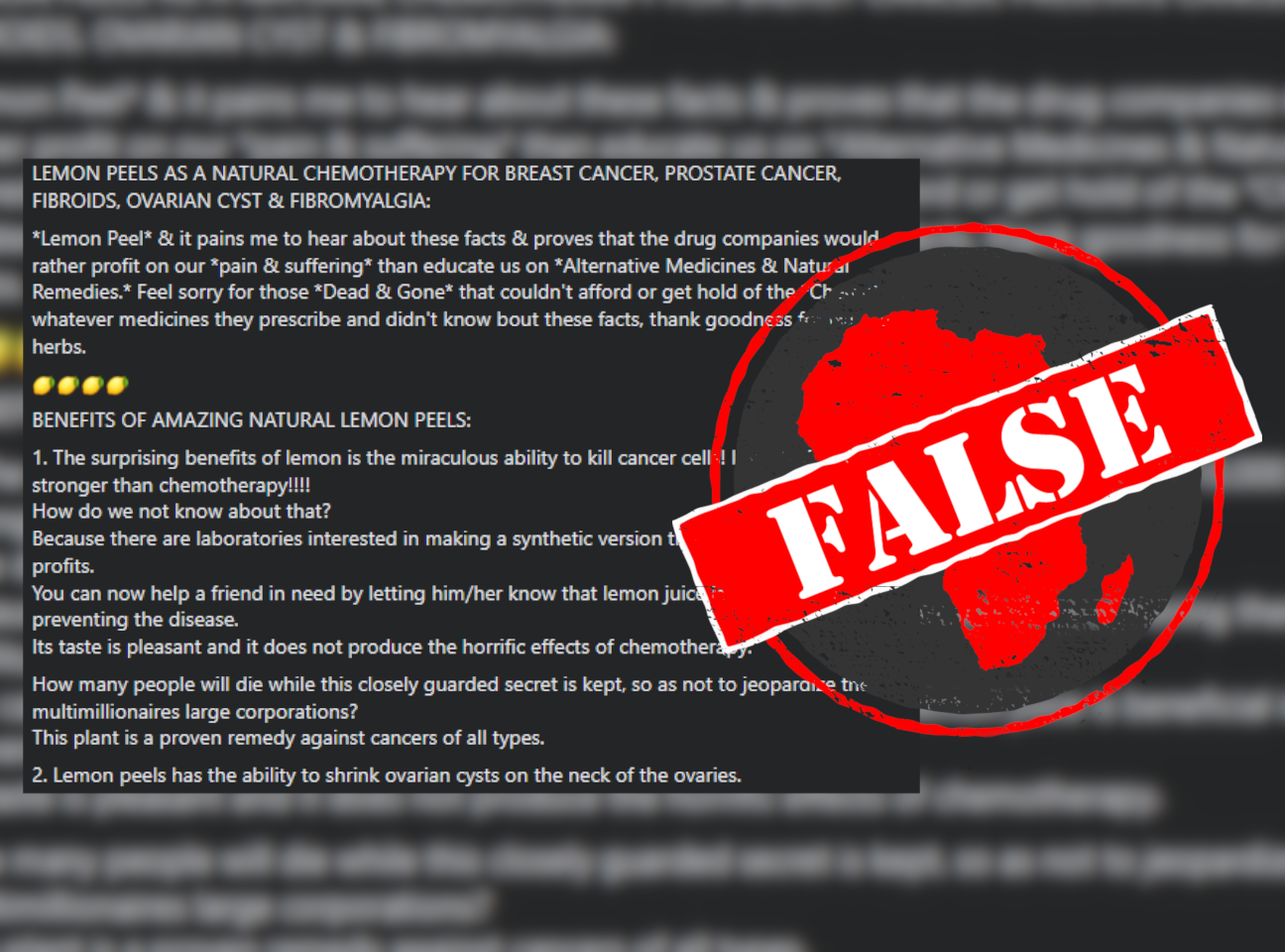IN SHORT: Facebook posts claim that lemon peel has a range of benefits, from curing cancer to regulating blood pressure. But there is no evidence to support these claims.
Lemon peel is “a natural chemotherapy”, according to a post doing the rounds on Facebook in South Africa.
The claim lists a few “benefits” of using lemon peel, including their “miraculous ability to kill cancer cells” and that it is “10,000 times stronger than chemotherapy”.
The evidence for this, according to the claim, is that “there are laboratories interested in making a synthetic version that will bring them huge profits”.
The post then lists a few other potential “benefits” of the fruit’s peel, such as:
- The ability to shrink ovarian cysts in the ovaries.
- The ability to regulate blood pressure.
- The ability to combat stress, depression and nervous disorders.
The same claim can be found here, here, here, here and here.
It was also posted in 2022 here and here, and in 2021 here, here, here and here.
The claim instructs readers to freeze a whole lemon then shred it with a grater, without peeling it, and “sprinkle it on food”.
But is it really true that lemon peel is 10,000 times stronger than chemotherapy and can kill cancer cells, among other promises?
We checked.

Lemon peel is not ‘10,000 times stronger’ than chemotherapy
Chemotherapy is a drug treatment of strong chemicals, most often used to treat cancer by killing fast-growing cancerous cells in the body. But it is also used to treat other conditions, such as some autoimmune diseases and blood disorders.
There are different types of chemotherapy medications, and common side effects of the treatment include nausea and vomiting, hair loss and fatigue.
Just like other false “miracle” cures Africa Check has debunked before, there is no evidence that lemon peel is stronger than, or can replace, chemotherapy in treating cancer.
Independent cancer research organisation Cancer Research UK says there’s little evidence that “miracle cures” like these actually work.
“Despite what people may claim, videos and stories are not scientific evidence for the effectiveness of any cancer treatment,” Cancer Research UK says.
They highlight the importance of published data that includes clinical trials in peer-reviewed scientific and medical journals.
“This is the standard to which all conventional cancer treatments are held, and it’s one that alternative treatments should be held to too. Anecdotes and videos prove nothing and benefit no-one – we need reliable, scientific research to judge whether a treatment is effective.”
While there may be evidence that the vitamin C in lemon peel could boost the effectiveness of cancer treatments like chemotherapy, it cannot cure cancer, says the Mayo Clinic, a research hospital in the US.
Most ovarian cysts will disappear on their own and lemon peel won’t regulate blood pressure
The Facebook posts also claim that lemon peel has the ability to “shrink ovarian cysts in the ovaries”. Ovarian cysts are fluid-filled sacs that develop on the ovaries, the glands situated on either side of the uterus.
Anyone with ovaries can develop these cysts and there are many different types, most being painless and harmless.
The most common type is the functional cyst, which occurs as a result of ovulation. They will shrink over time without specific treatment.
“Cysts often disappear on their own without treatment, but in some cases they may require surgical removal,” says Johns Hopkins School of Medicine.
Since the majority of ovarian cysts are benign and disappear over time, and treatment for more serious cysts involve surgery, there is no evidence that simply eating lemon peel would shrink these cysts.
The Facebook posts also claim that lemon peel, along with curing cancer and shrinking ovarian cysts, can regulate blood pressure.
Africa Check has previously fact-checked a similar claim about a mixture of lemon, garlic and ginger for curing high blood pressure. Experts have warned that there is no single solution when it comes to regulating blood pressure.
“Most times, we advise anyone battling high blood pressure to change their diet and lifestyle,” an expert told us, warning that those who feel unwell should rather visit their doctor for medical advice.
No evidence for combating stress, depression and nervous system disorders
Last on the list of “benefits” of the lemon peel, according to the Facebook posts, is its ability to combat stress, depression and nervous system disorders.
Depression is a common mental health condition that affects how a person may feel, think or handle routine daily activities.
It is not exactly clear what is meant by “nervous disorders” as mentioned in the Facebook posts. Based on context, the posts are probably referring to anxiety disorder, a type of mental health condition where people feel above-normal amounts of fear or dread.
Treatment for mental health conditions depend on the type, severity and what may work best for each person, but common types of treatment include medication, psychotherapy and treatment programmes.
There have been studies conducted on the effects of lemon oil vapour and citrus essential oils in combating depression and anxiety. But these were conducted on mice, with no human trials. We found no evidence that lemon peels alone could cure or prevent these mental health conditions.
These claims about the “benefits” of lemon peel are false.
Republish our content for free
For publishers: what to do if your post is rated false
A fact-checker has rated your Facebook or Instagram post as “false”, “altered”, “partly false” or “missing context”. This could have serious consequences. What do you do?
Click on our guide for the steps you should follow.
Publishers guideAfrica Check teams up with Facebook
Africa Check is a partner in Meta's third-party fact-checking programme to help stop the spread of false information on social media.
The content we rate as “false” will be downgraded on Facebook and Instagram. This means fewer people will see it.
You can also help identify false information on Facebook. This guide explains how.



Add new comment